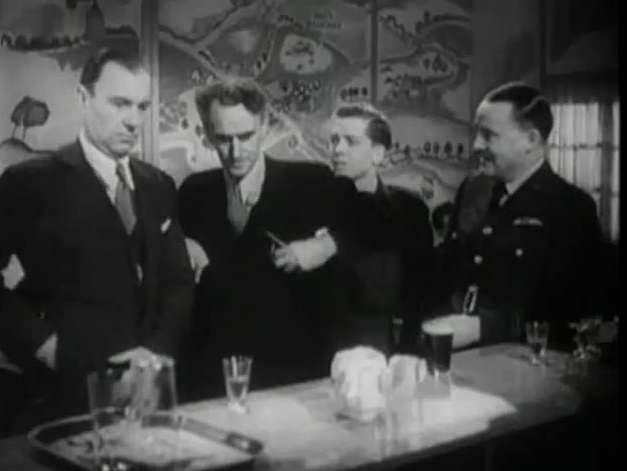School for Secrets

Etymology
of “boffin”, puffin + Baffin. Development of radar. The battle of Britain.
“I’m
cold.”
“We only
just left the ground, it’s probably nerves.”
“I don’t
suffer from nerves, I’m cold.”
To
see in the dark, through cloud, “in thunder, lightning, or in rain.”
A
positively Nabokovian study of the species, an especially brilliant, virtuosic
film.
“Still, you
must admit that L.-J.’s a first class brain.”
“Why?”
“Well, I
can’t understand a word the fellow says. Must be first class.”
A
marked influence on The Quiller
Memorandum (dir. Michael Anderson), and cp. The Last
Time I Saw Archie (dir. Jack Webb).
“You’ve
got to hand it to these Germans, they’re just as
bad at losing as they are at winning!”
Hildyard
cinematography, score Rawsthorne, screenplay the
director (Anderson assistant).
“Hn, I suppose
this is first gear?”
“Experimentation
is the cream of life, I’ll not spoil your
pleasure by tellin’ ye.”
TV Guide, “absorbing but at times badly flawed”. Britmovie, “sprightly melodrama.” Halliwell’s Film Guide, “an unsatisfactory
entertainment”.
Vice Versa
The great gift of
the malachite left eye (setting made in Sheffield) of the idol in the Temple of
the Laughing Hyena at Battledore, India, where they know a tourist when they
see one, “worth a million rupees”.
It grants sight
to the blind, a stockbroker in the borough of Paddington who believes that his
fiancée, a dancer at the Metropolitan Theatre, is in love with him, and that
his son’s headmaster, Dr. Grimstone, is the repository of all virtues and
all knowledge, by the simple expedient of granting the man’s wish to be a
boy again and the boy’s to be a man, so that the stockbroker suffers
under the moneygrubbing lunatic and the pupil invests in the horseless carriage
of 1896 with the bounder who stole the eye in the first place and who is in
cahoots with the fiancée.
The boy goes to
Harrow, the stockbroker takes up better lodgings.
Romanoff and Juliet
The basis of this
is Shakespeare and the simple joke on both Cold War adversaries, they can go
fuck themselves. It works both ways (cp. Left
Right and Centre, dir. Sidney Gilliat).
Absolutely one of
the funniest comedies ever filmed.
Critics have
always slighted it under the theory of a pox on both your houses.
That is just what
does not happen.
Billy Budd
The case presents
no difficulties in what is simply a wartime “drum-head”
court-martial aboard a ship of the Royal Navy where a sailor is wrongfully
convicted of killing a superior officer who had traduced him out of
incompetence. The captain and other officers are good and sensible men who in
this instance fail to carry out their duty.
Variety faulted Ustinov but thought the film was
“allegorical”. It is merely extremely fine, to such an extent that
Crowther faulted the ending as “intellectual”, meaning it taxed his
mind.
Melville’s
hand is fully seen after the verdict has definitively been reached, his
foretopman is the perfect merchant seaman, an impressed tar with
“initiative”, only he has a stammer when pronouncing against
wrongs, and so cannot defend himself when falsely accused, “speak, hands,
for me!”
Everything is
made patently clear, all the while Ustinov is filming aboard sailing ships at
sea or perfectly synchronized interior sets that sway and groan authentically
throughout.
Yet all reviewers
say it is a failure in one way or another.
Lumet made The
Hill shortly thereafter, Wiard Tom Horn later on, the first an
especially close analysis.
The naval law
admits no remedy, the captain and his court are unable to avoid a hanging.
Billy Budd is
such a perfect seafaring man that, in the face of duty carried out so
perfectly, as he too understands it, he dies with a blessing on his lips.
“Fumbled on
almost every level,” says Dave Kehr in the Chicago Reader,
confusing the representation with what is represented.
Lady L
Her mind, a modus
vivendi, and that is a great relief that follows upon the torturous
self-congratulatory genius of Billy Budd, precisely what one should
expect, a thing of two minds, understanding established between the reasonable
pair of two opposites, French anarchist and English aristocrat, for example, clochard
et vieillard if the latter is rich and distinguished, just as the Corsican
lady begins her career as a laundress serving a Parisian whorehouse frequented
by the leaders of the nation.
Expressly her
biography is the substance of the film, no biographer in England would ever
dream etc.
No critic in
Hollywoodland to be sure but had no use or precious little for the grand
sublimate of the joke presented as the recollections of a certain Countess of
Camoëns, née in Nice or thereabouts.
Hammersmith Is Out
A
nose-pickin’ shit-kicker and his diner dolly rise from nothin’ to
the very cream by making that deal Jesus turned down, with a mental patient.
The critics,
except Ebert, didn’t like it, it made them sad and annoyed.
Memed My Hawk
A vivid
masterpiece of a vivid story quite close in its way to the Arabian Nights and
antiquity in general, which is all part of the fun as it’s laid in Turkey
after the Great War.
A further level
of comic significance is added by the filming in Yugoslavia, Ustinov might very
well have taken his cue from Kazan’s America America.
Memed takes his
bride away from the local Aga’s idiot nephew and goes to the mountains
among the brigands, the girl is imprisoned awaiting trial, the crafty
illiterate Aga is very hard to kill.
Caryn James in
the New York Times thought it should have been agitprop, Time Out
Film Guide up to the usual line says “hopelessly mangled and
confused”.